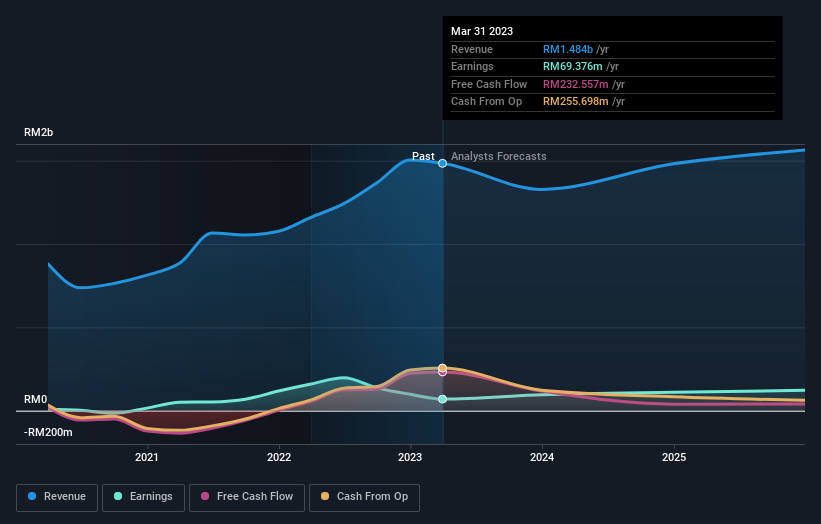Malaysia Smelting Corporation Berhad (KLSE:MSC) stock most popular amongst private companies who own 54%, while individual investors hold 31%
Key Insights
The considerable ownership by private companies in Malaysia Smelting Corporation Berhad indicates that they collectively have a greater say in management and business strategy
Tan Chin Tuan Pte Ltd owns 52% of the company
Using data from analyst forecasts alongside ownership research, one can better assess the future performance of a company
If you want to know who really controls Malaysia Smelting Corporation Berhad (KLSE:MSC), then you'll have to look at the makeup of its share registry. And the group that holds the biggest piece of the pie are private companies with 54% ownership. In other words, the group stands to gain the most (or lose the most) from their investment into the company.
Meanwhile, individual investors make up 31% of the company’s shareholders.
Let's take a closer look to see what the different types of shareholders can tell us about Malaysia Smelting Corporation Berhad.
View our latest analysis for Malaysia Smelting Corporation Berhad
What Does The Institutional Ownership Tell Us About Malaysia Smelting Corporation Berhad?
Many institutions measure their performance against an index that approximates the local market. So they usually pay more attention to companies that are included in major indices.
We can see that Malaysia Smelting Corporation Berhad does have institutional investors; and they hold a good portion of the company's stock. This implies the analysts working for those institutions have looked at the stock and they like it. But just like anyone else, they could be wrong. When multiple institutions own a stock, there's always a risk that they are in a 'crowded trade'. When such a trade goes wrong, multiple parties may compete to sell stock fast. This risk is higher in a company without a history of growth. You can see Malaysia Smelting Corporation Berhad's historic earnings and revenue below, but keep in mind there's always more to the story.
Hedge funds don't have many shares in Malaysia Smelting Corporation Berhad. Our data shows that Tan Chin Tuan Pte Ltd is the largest shareholder with 52% of shares outstanding. This essentially means that they have extensive influence, if not outright control, over the future of the corporation. Yew Choo Yeoh is the second largest shareholder owning 2.2% of common stock, and Neoh Choo Ee & Company Sdn Bhd holds about 1.2% of the company stock.
While studying institutional ownership for a company can add value to your research, it is also a good practice to research analyst recommendations to get a deeper understand of a stock's expected performance. There are a reasonable number of analysts covering the stock, so it might be useful to find out their aggregate view on the future.
Insider Ownership Of Malaysia Smelting Corporation Berhad
The definition of company insiders can be subjective and does vary between jurisdictions. Our data reflects individual insiders, capturing board members at the very least. The company management answer to the board and the latter should represent the interests of shareholders. Notably, sometimes top-level managers are on the board themselves.
I generally consider insider ownership to be a good thing. However, on some occasions it makes it more difficult for other shareholders to hold the board accountable for decisions.
We can report that insiders do own shares in Malaysia Smelting Corporation Berhad. As individuals, the insiders collectively own RM61m worth of the RM848m company. It is good to see some investment by insiders, but we usually like to see higher insider holdings. It might be worth checking if those insiders have been buying.
General Public Ownership
With a 31% ownership, the general public, mostly comprising of individual investors, have some degree of sway over Malaysia Smelting Corporation Berhad. While this size of ownership may not be enough to sway a policy decision in their favour, they can still make a collective impact on company policies.
Private Company Ownership
It seems that Private Companies own 54%, of the Malaysia Smelting Corporation Berhad stock. It might be worth looking deeper into this. If related parties, such as insiders, have an interest in one of these private companies, that should be disclosed in the annual report. Private companies may also have a strategic interest in the company.
Next Steps:
It's always worth thinking about the different groups who own shares in a company. But to understand Malaysia Smelting Corporation Berhad better, we need to consider many other factors. For example, we've discovered 2 warning signs for Malaysia Smelting Corporation Berhad that you should be aware of before investing here.
If you are like me, you may want to think about whether this company will grow or shrink. Luckily, you can check this free report showing analyst forecasts for its future.
NB: Figures in this article are calculated using data from the last twelve months, which refer to the 12-month period ending on the last date of the month the financial statement is dated. This may not be consistent with full year annual report figures.
Have feedback on this article? Concerned about the content? Get in touch with us directly. Alternatively, email editorial-team (at) simplywallst.com.
This article by Simply Wall St is general in nature. We provide commentary based on historical data and analyst forecasts only using an unbiased methodology and our articles are not intended to be financial advice. It does not constitute a recommendation to buy or sell any stock, and does not take account of your objectives, or your financial situation. We aim to bring you long-term focused analysis driven by fundamental data. Note that our analysis may not factor in the latest price-sensitive company announcements or qualitative material. Simply Wall St has no position in any stocks mentioned.
Join A Paid User Research Session
You’ll receive a US$30 Amazon Gift card for 1 hour of your time while helping us build better investing tools for the individual investors like yourself. Sign up here

 Yahoo Finance
Yahoo Finance 

